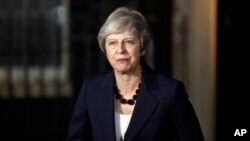British Prime Minister Theresa May tried to persuade her divided cabinet Wednesday to accept a draft agreement on the terms of Britain's exit from the European Union, telling them it fulfills the wishes of British voters.
May faced a crucial test as she met with lawmakers in a marathon session in the House of Commons. She told legislators the draft deal "takes us significantly closer to delivering what the British people voted for in the referendum" of 2016 that elected to leave the EU.
The prime minister said Britain would "take back control of our borders, our laws and our money ... while protecting jobs, security and the integrity of our United Kingdom."
By Wednesday night, there was no news on whether May had convinced cabinet members to support the draft agreement.
Negotiators from Britain and the EU reached the deal Tuesday after lengthy negotiations, but details have not been made public.
May must convince her senior ministers to support the agreement, which would later also need to be approved by Britain's parliament.
But that task will not be easy with lawmakers sharply divided on the so-called Brexit, including criticism of May's approach by both those who want Britain to leave the bloc and those who would rather it remain an EU member.
May has sought to keep as close a relationship as possible to the EU when Brexit becomes official on March 29, 2019.
One of the major sticking points in negotiations has been what to do about Northern Ireland, which shares a border with EU member Ireland. With Britain leaving the EU, an area that currently allows freedom of movement for people and goods, new rules are required governing how those activities can continue.
Irish broadcaster RTE said the draft agreement includes a customs arrangement with special conditions for Northern Ireland.
During the negotiations, Britain has sought some sort of time limit for such an arrangement, while the EU has said it would need to be permanent.
May's party does not have a majority in parliament and relies on the support of the Northern Irish Democratic Unionist Party (DUP).
DUP leader Arlene Foster said a potential customs arrangement would weaken Britain and that the prime minister could not argue it is in the interest of the nation.
"It would be democratically unacceptable for Northern Ireland trade rules to be set by Brussels," she said in a statement. "Northern Ireland would have no representation in Brussels and would be dependent on a Dublin government speaking up for our core industries."
Former Foreign Minister Boris Johnson expressed similar views in calling a customs deal "utterly unacceptable to anyone who believes in democracy."
But May's chief whip, Julian Smith, expressed optimism the agreement with the European Union will succeed.
"I'm confident we'll get this through parliament and that we can deliver on what the prime minister committed to on delivering Brexit, but making sure that that is in the best interests of companies, businesses and families," Smith said.





